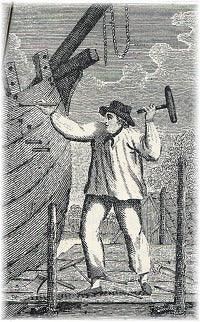The Mariner
Anne thought she left great happiness behind her when they quitted the house; and Louisa, by whom she found herself walking, burst forth into raptures of admiration and delight on the character of the navy; their friendliness, their brotherliness, their openness, their uprightness; protesting that she was convinced of sailors having more worth and warmth than any other set of men in England; that they only knew how to live, and they only deserved to be respected and loved.
-Persuasion
A Mariner is in common language the same as sailor or seaman. Mariners are sometimes employed on board merchant ships, and sometimes in men of war. In merchants' employ, the mariners are accountable to the master, the masters to the owners of the vessel, and the owners to the merchant, for any damages that may happen. If a vessel is lost by tempest, the mariners lose their wages, and the owners their freight: this is intended to make them use their utmost endeavors to preserve the ship committed to their care. 
Mariners on board the king's ships are subject to strict regulations, which, however, depend on certain fixed laws passed at different times by parliament. Mariners who are not in His Majesty's service are liable during the time of war to be impressed, unless they enter voluntarily, to which they are encouraged by bounties and high wages: and every foreign seaman, who, during war shall serve two years in any man of war, merchantman, or priviteer, becomes naturalized.
The mariner represented in the plate is of a higher rank and estimation than common sailors: he understands the art of navigation, or of conducting a vessel from one place to another, in the safest, shortest, and most commodious way. He ought therefore to be well acquainted with the islands, rocks, sands, and straits, near which he has to sail. He should also know the signs which indicate the approach to land: these are, the appearance of birds; the floating of weeds on the surface of the sea; the depth and the colour of the sea. He should, moreover, understand the nature of the winds, particularly the times when the trade winds and monsoons set in; the seasons when storms and hurricanes may be expected, and the signs of their approach; the motion of currents and tides. He must understand also the working of a ship; that is, the management of the sails, rigging, &c.
Navigation, or the proper employment of the mariner, is either common or proper. The former is usually called coasting; that is, where the ships are on the same or very neighboring coasts; and where the vessel is seldom out of sight of land, our out of reach of sounding. In this case little more is required than an acquaintance with the lands they have to pass, the compass, and the sounding line. To gain a knowledge of the coast, a good chart or map is necessary. 
The compass, or mariners compass, as it is usually called, is intended to direct and ascertain a ship's course at sea. It consists of a circular brass box, which contains a card, with the thirty two points of the compass fixed on a magnetic needle that always turns to the north, or nearly so. The needle with the card turns on an upright pin fixed in the centre of the box. The top of the box is covered with glass, to prevent the wind from disturbing the motion of the card. The whole is inclosed in another box of wood, where it is suspended by brass hoops ot keep the car in a horizontal posisition, whatever the motion of the ship may be: and it is so placed in the ship, that the middle section of the box may lie over the middle section of the ship along its keel.
The method of finding, by the compass, the direction in which a ship sails, is this: The compass being suspended, the mariner looks horizontally over it in the direction of the ship's wake* , by which he sees the point of the compass denoting the direction of the wake; the point opposite to this is that to which the ship is sailing according to the compass; and knowing how much the compass varies, he can tell the true point of the horizon to which he is going. The sounding-line is a line with a plummet at the end: it is used to try the depth of the water and the quality of the bottom.
In Navigation proper, which is where the voyage is long, and pursued through the mail ocean, there are many other requisites wanted besides those already mentioned. Here a considerable skill in practical mathematics and astronomy is required, and an aptness in using instruments for celestial observations. One of thiese instruments the mariner in the plate is represented holding in his right hand, while he is pointing to his ship with the other.
The boat which is to carry him on board the ship is drawn to shore. At a distance in the sea is represented a light-house, erected on a rock, and having in the night a fire or other considerable light at the top, so as to be seen at a great distance from land. The use of the light-house is to direct the ships on the coast, to prevent them from running on the shore, and from other injuries by an improper course. The wages of a mariner depend upon his employment, that is, whether he be in the King's service or on board a merchantman: they depend also upon the size of the ship, and upon the situation which he holds in it.
 There is no profession of more importance to the interests of this country than that of the mariner. Government therefore provides, for those who are disabled, a place in Greenwich Hospital; and to the widows and children of those who are slain in defending their country, small pensions are granted. Greenwich Hospital is supported by the nation, and by sixpence a month deducted out of every seaman's wages.
There is no profession of more importance to the interests of this country than that of the mariner. Government therefore provides, for those who are disabled, a place in Greenwich Hospital; and to the widows and children of those who are slain in defending their country, small pensions are granted. Greenwich Hospital is supported by the nation, and by sixpence a month deducted out of every seaman's wages.
*The wake of a ship is the print or track impressed by the course of the ship on the surface of the water.
From "The Book of Trades, or Library of Useful Arts" published by Jacob Johnson, in 1807, with the original copper plate engraving.
Enjoyed this article? If you don't want to miss a beat when it comes to Jane Austen, make sure you are signed up to the Jane Austen newsletter for exclusive updates and discounts from our Online Gift Shop.



Leave a comment
This site is protected by hCaptcha and the hCaptcha Privacy Policy and Terms of Service apply.